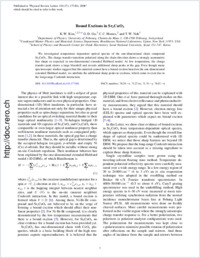Bound Excitons in Sr₂CuO₃
- Kim, Kyung Wan Department of Physics, University of Fribourg, Switzerland - Condensed Matter Physics and Materials Science Department, Brookhaven National Laboratory, Upton, New York, USA - School of Physics and Research Center for Oxide Electronics, Seoul National University, Korea
- Gu, G. D. Condensed Matter Physics and Materials Science Department, Brookhaven National Laboratory, Upton, New York, USA
- Homes, C. C. Condensed Matter Physics and Materials Science Department, Brookhaven National Laboratory, Upton, New York, USA
- Noh, T. W. School of Physics and Research Center for Oxide Electronics, Seoul National University, Korea
-
17.10.2008
Published in:
- Physical Review Letters. - 2008, vol. 101, no. 17, p. 177404
English
We investigated temperature dependent optical spectra of the one-dimensional chain compound Sr₂CuO₃. The charge transfer transition polarized along the chain direction shows a strongly asymmetric line shape as expected in one-dimensional extended Hubbard model. At low temperature, the charge transfer peak shows a large blueshift and reveals additional sharp peaks at the gap. Even though many spectroscopic studies suggest that this material cannot have a bound exciton based on the one-dimensional extended Hubbard model, we attribute the additional sharp peaks to excitons, which come to exist due to the long-range Coulomb interaction.
- Faculty
- Faculté des sciences et de médecine
- Department
- Département de Physique
- Language
-
- English
- Classification
- Physics
- License
- License undefined
- Identifiers
-
- RERO DOC 11349
- DOI 10.1103/PhysRevLett.101.177404
- Persistent URL
- https://folia.unifr.ch/unifr/documents/300952
Statistics
Document views: 80
File downloads:
- kim_bes.pdf: 99
